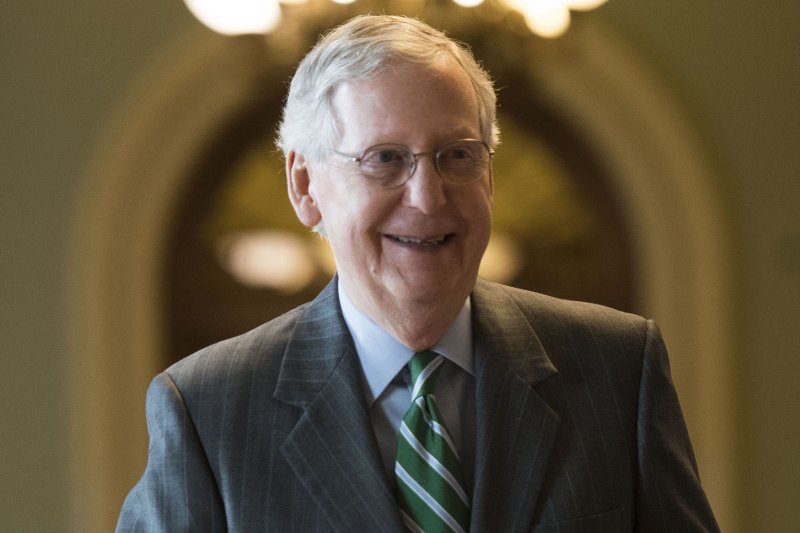Senate Majority Leader Mitch McConnell, R-Ky., walks out of the Senate chambers after unveiling the Republican healthcare bill on June 22. But one week, later he delayed a procedure vote on the bill until after a Fourth of July recess because he didn't have enough support. On Tuesday, he announced the Senate will delay its August recess to deal with healthcare and other matters. Photo by Kevin Dietsch/UPI |
License Photo
July 11 (UPI) -- U.S. Senate Majority Leader Mitch McConnell announced Tuesday the annual August recess will be delayed three weeks to deal with healthcare, taxes, the budget and presidential nominations.
"In order to provide more time to complete action on important legislative items and process nominees that have been stalled by a lack of cooperation from our friends across the aisle, the Senate will delay the start of the August recess until the third week of August," McConnell said in a statement.
The Senate had been scheduled to begin its five-week recess on July 31. Instead, they work through the week of Aug. 14. He noted the Senate could recess earlier.
President Donald Trump has suggested that Congress should postpone or cancel the recess. On Monday, he posted on Twitter: "I cannot imagine that Congress would dare to leave Washington without a beautiful new HealthCare bill fully approved and ready to go!"
McConnell said after senators attempt to repeal and replace the Affordable Care Act, they will tackle the National Defense Authorization Act "and the backlog of critical nominations that have been mindlessly stalled by Democrats."
The Senate majority leader hopes to have revised healthcare legislation by the end of this week.
On June 27, McConnell postponed a procedural vote on the original GOP Senate healthcare plan before the Fourth of July recess because he lacked the necessary votes to pass it.
Because all Democrats oppose replacing the Affordable Care Act, the Republicans can only lose two of their 52 votes. At least nine Senate Republicans -- conservatives and moderates -- have publicly opposed the original version of the bill according to CBS News.
Iowa Sen. Charles Grassley, a Republican, is "very pessimistic" they can settle their differences.
If the bill collapses, McConnell has said he would focus on writing a more limited bill that likely would require Democratic support.
It's been a balancing act to please both sides.
On one extreme is Kentucky Sen. Rand Paul, who says if Republicans attempt to work with Democrats, conservative voters would rebel. Conservatives want flexibility in healthcare plans and end to regulations in the Affordable Care Act.
But moderate Republicans, including Susan Collins of Maine, are concerned about cuts to Medicaid, more Americans without healthcare and protections for those with preexisting medical conditions.
The Senate has other work to do.
Without a funding bill, the government will shut down on Oct. 1. The nation's borrowing limit needs to be raised by the end of September or early October to prevent a possible default by the U.S. government.
Trump also has criticized Democrats for holding up his nominations.
On Tuesday, he posted on Twitter: "The Senate Democrats have only confirmed 48 of 197 Presidential Nominees. They can't win so all they do is slow things down & obstruct!"
But Trump has not nominated 382 of 564 positions, according to a database maintained by The Washington Post and The Partnership for Public Service. He has offered formal nominations for 129 of those positions, of which 47 have been confirmed. Six people have been announced as nominations but haven't been submitted to the Senate for confirmation.
Trump and his spokespeople have said positions have been left vacant to trim the size of the federal government.















